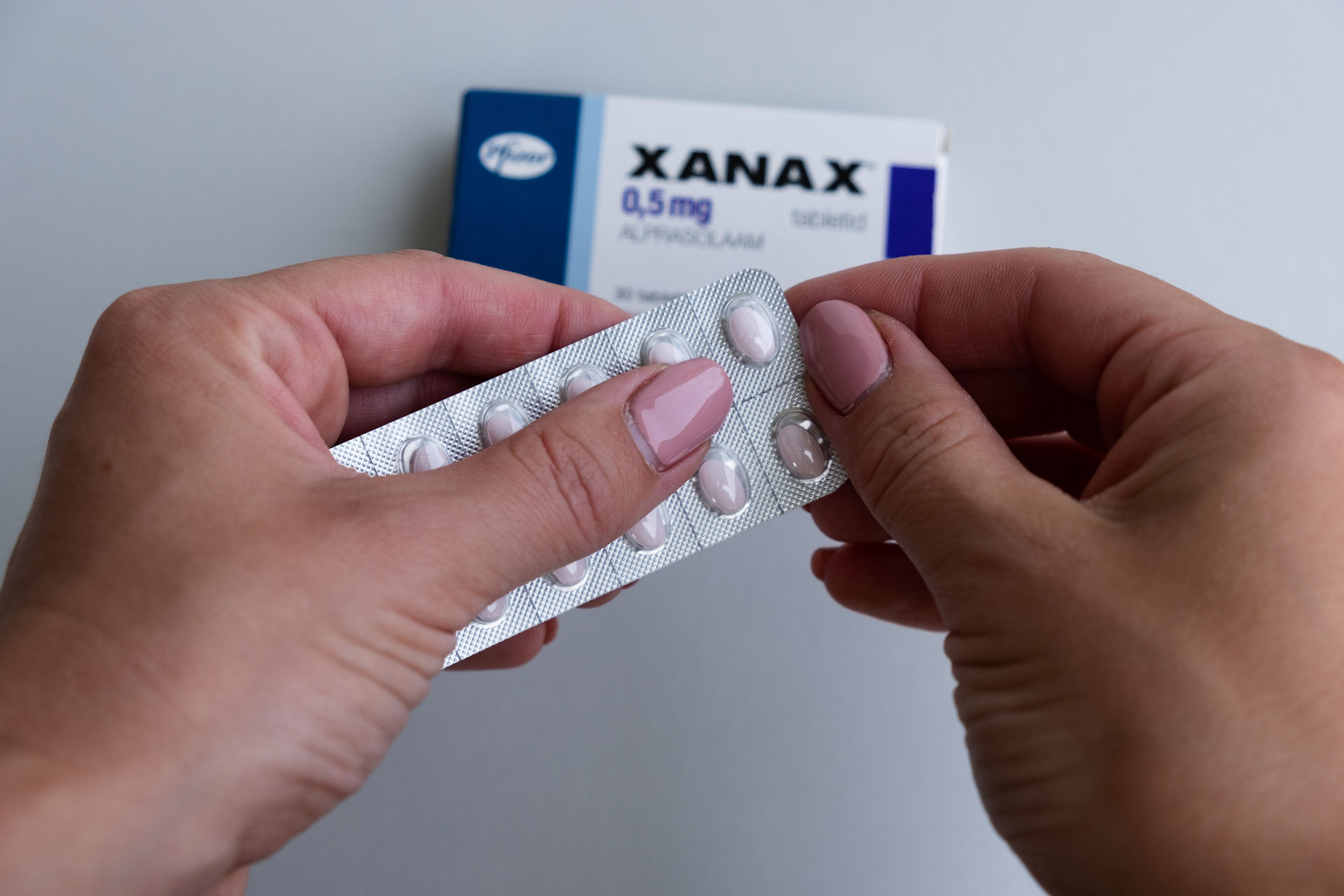What is Xanax?
Jump to Section
Xanax is a prescription medication used to treat anxiety and panic disorders. It belongs to a class of drugs called benzodiazepines, which work by slowing down the central nervous system and producing feelings of calmness and relaxation. Xanax is one of the most commonly prescribed medications in the United States, with over 25 million prescriptions. If you are experiencing signs of Xanax addiction, contact us today to get started on treatment.
What are the Effects of Xanax?
When taken as prescribed, Xanax can be effective in treating anxiety and panic disorders. However, like any medication, it also comes with potential side effects. Some of the common side effects of Xanax include drowsiness, dizziness, headache, blurred vision, and changes in appetite. In some cases, Xanax may also cause paradoxical reactions such as increased anxiety, agitation, and aggression.
What is Alcohol?

Alcohol, on the other hand, is a depressant that is widely used for its intoxicating effects. It affects the central nervous system by slowing down brain activity and producing feelings of euphoria and relaxation. While it is legal for individuals over the age of 21 to consume alcohol in moderation, excessive use can lead to serious health problems. If you are experiencing signs of alcoholism, contact our alcohol rehab treatment center today.
What are the Effects of Alcohol?
Alcohol affects each person differently, depending on factors such as body weight and tolerance. However, some common effects of alcohol include impaired judgment, loss of coordination, slurred speech, and slowed reaction times. Continued heavy use can also lead to long-term health issues such as liver damage, heart disease, and certain types of cancer. In addition to these physical effects, excessive alcohol consumption can also have negative impacts on mental health, leading to symptoms of depression and anxiety.
The Dangers of Mixing Xanax and Alcohol
While both Xanax and alcohol can have calming effects on the body, combining the two can be extremely dangerous. This is because both substances work by slowing down brain activity, and when taken together, they can intensify each other’s effects. Furthermore, mixing Xanax and alcohol can also increase the risk of various negative side effects, including:
- Drowsiness and dizziness
- Impaired motor skills and coordination
- Slurred speech
- Memory problems
- Nausea and vomiting
- Blackouts or loss of consciousness
Why are College Students More at Risk of Abusing Xanax?
College students are particularly at risk of mixing Xanax and alcohol due to the high prevalence of both substances on college campuses. According to a study by the National Institute on Alcohol Abuse and Alcoholism, more than 60% of college students reported drinking alcohol in the past month, and about one-third engaged in binge drinking (consuming five or more drinks in two hours). Additionally, the Anxiety and Depression Association of America reports that one in five college students has abused prescription drugs such as Xanax. If you are experiencing signs of Xanax abuse, we can assist you.
Increased Risk of Overdose
One of the greatest dangers of mixing Xanax and alcohol is an increased risk of overdose. Both substances can cause respiratory depression, which is when the body’s natural breathing rhythm becomes slow and shallow. When taken together, Xanax and alcohol can suppress the respiratory system to dangerous levels, leading to difficulty breathing or even stopping breathing altogether. This can result in coma or death if left untreated.
Long-Term Effects of Mixing Xanax and Alcohol
Repeatedly mixing Xanax and alcohol can also have long-term effects on both physical and mental health. Some of the potential consequences include:
- Liver damage and liver disease
- Increased risk of seizures
- Worsening of symptoms related to anxiety or panic disorders
- Development of a tolerance, leading to increased use and potential addiction
- Memory loss and cognitive impairment
Seeking Help for Xanax and Alcohol Abuse
If you or someone you know is struggling with mixing Xanax and alcohol, it is important to seek help from a medical professional. Quitting these substances cold turkey can cause severe withdrawal symptoms and should only be done under the supervision of a doctor. Treatment for substance abuse may include therapy, support groups, medical detox in Washington, or a combination of these methods. Remember, seeking help is not a sign of weakness but a brave step towards a healthier and happier life. So, it’s important to reach out for help as soon as possible.
What are the Treatment Options for those Struggling with Xanax and Alcohol Abuse?
There are several treatment options available for individuals struggling with Xanax and alcohol abuse. Some of the most common include:
- Inpatient Rehabilitation: This involves staying at a treatment facility for an extended time to receive intensive therapy, support, and medical care.
- Outpatient Treatment: This type of treatment allows individuals to continue living at home while attending scheduled therapy sessions at a treatment center.
- Support Groups: Many people find support and guidance through 12-step programs such as Alcoholics Anonymous (AA) or Narcotics Anonymous (NA).
- Medication-Assisted Treatment: Certain medications may be used to help manage withdrawal symptoms and cravings while undergoing therapy for substance abuse.
Mixing Xanax and alcohol can have severe consequences on an individual’s physical and mental health. It is crucial to avoid combining these substances and seek help if you or someone you know is struggling with substance abuse. By being aware of the dangers and seeking proper treatment, it is possible to overcome addiction and lead a healthier life. Remember, you are not alone in this journey towards recovery. With the right support and determination, it is possible to overcome addiction and live a fulfilling life.
Free by the Sea Can Assist with Xanax and Alcohol Abuse

If you or a loved one is struggling with Xanax and alcohol abuse, Free by the Sea offers comprehensive and personalized treatment programs to help individuals overcome addiction. Our team of experienced professionals is dedicated to providing compassionate care and support throughout the recovery journey. Contact us today to learn more about our services and how we can help you on your path toward healing.

Dr. Richard Crabbe joined our team in 2019 as our psychiatrist and medical director. He attended the University of Ghana Medical School where he became a Medical Doctor in 1977. From 1978 through 1984, he was a medical officer in the Ghana Navy and provided a variety of services from general medicine to surgeries. He received his Certificate in General Psychology from the American Board of Psychology and Neurology in 2002.

 March 27th, 2024
March 27th, 2024










